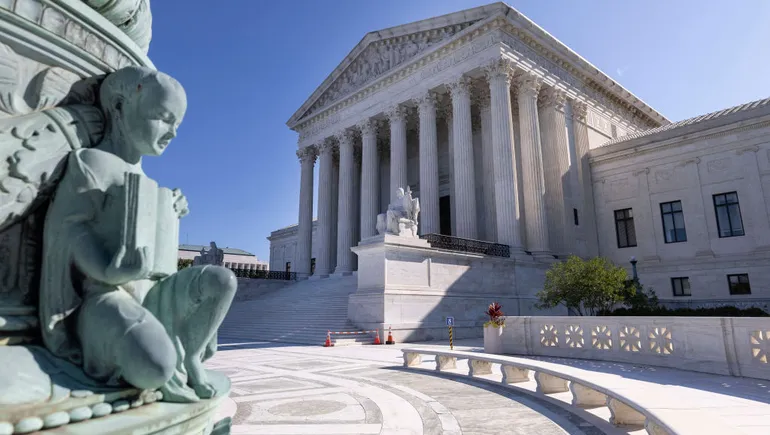The Supreme Court on Thursday upheld the Consumer Financial Protection Bureau’s funding structure in a 7-2 vote, effectively ending arguments that threatened to break up the agency.
At issue was the process by which the CFPB receives its spending through the Federal Reserve System rather than through Congress. a pair of industry organizations; Community Financial Services Association of America and Consumer Services Alliance of Texasfiled a lawsuit with the CFPB in 2018 to invalidate the agency’s rules that prohibit payday lenders from automatically withdrawing payments from borrowers’ bank accounts.
The Fifth Circuit Court of Appeals in 2022 rejected many of the industry groups’ findings, but agreed that the CFPB’s funding structure violates the U.S. Constitution’s separation of powers. of 2nd U.S. Circuit Court of AppealsIn contrast, a March 2023 ruling found the CFPB’s funding structure constitutional, setting off a showdown in the Supreme Court.
“The Department’s funding does not violate the Appropriations Clause,” Justice Clarence Thomas wrote in the majority opinion Thursday.
It is also significant that a Republican-appointed judge wrote an opinion defending the CFPB. The Supreme Court has heard arguments regarding the department before. In 2020, the court ruled 5-4 along party lines that the president can fire CFPB directors “at will,” not just for cause.
Democrats have typically argued that the agency’s distance from Congress helps it stay focused on consumers. Republicans, on the other hand, often brand the agency as a maverick agency that interferes with free markets.
“Despite the setback from today’s ruling, Republicans will continue the fight to rein in the corrupt CFPB.”” Rep. Patrick McHenry (R-North Carolina) said in a statement Thursday.
House Financial Services Committee Chairman McHenry called for support for a bill aimed at legally fixing the funding structure. “Right the mistakes of Dodd-Frank, which set a dangerous precedent for using central banks to fund partisan political objectives.”
Sen. Elizabeth Warren (D-Mass.) praised the decision Thursday, saying the CFPB is “here to stay.”
“This is not the last attack on the CFPB by Wall Street, the banks, and their Republican allies,” said Warren, the agency’s architect. “When you have an agency that is so effective in supporting working families against industry consumer abuse, it is clearly the target of a multi-million dollar lobbying effort. I will continue my work to fight the big banks that defraud people and level the playing field for everyone in this country.”
The Supreme Court may have intervened when it heard oral arguments in the case in October. Several judges, some of them Republican appointees, expressed skepticism about the payday lending groups’ claims.
“Congress has not determined how much this agency should spend,” former Solicitor General Noel Francisco, who served as the group’s attorney, told the Supreme Court last fall. “Instead, it delegates to the director the power to choose his own diversion targets, but the ceiling is so high that it rarely makes sense.”
Judge Amy Coney Barrett, a Trump appointee, asked Francisco: “So I think we’re all having a hard time understanding what the standard is that you’re going to use.” “How do you decide how much is too much or how specific is enough?”
Mr. Francisco argued that the CFPB’s funding structure allows it to be immersed in a “perpetual” flow of funds.
Justice Brett Kavanaugh, also appointed by President Trump, rejected that idea.
“Congress could change it tomorrow, but there’s nothing permanent or permanent about this,” he said.
Barrett and Kavanaugh voted in the majority Thursday, along with Thomas, Chief Justice John Roberts and three court-appointed Democrats: Sonia Sotomayor, Elena Kagan and Ketanji Brown Jackson. . Justices Samuel Alito and Neil Gorsuch dissented.
“There is clearly nothing wrong with a law that gives the government the power to withdraw as much money as it wants from specified sources for permissible purposes until the end of time,” Alito wrote in his dissent. I wrote it in “The CFPB enjoys a degree of financial autonomy that King Stuart would envy.”
Thursday’s ruling also moves forward on the CFPB’s goals, which have been somewhat on hold thus far, specifically small business data collection rules that a district court judge put on hold pending the Supreme Court’s outcome last fall. likely to mean.
But the CFPB will also gain confidence that its recent proposals on open banking and overdraft fees will not receive as much backlash.
Still, at least one trade group, the Consumer Bankers Association, said Thursday’s ruling “should not be seen as public support for the CFPB’s recent seemingly political rulemakings, many of which are important laws. It ignores legal requirements and raises concerns under the Administrative Procedures Act.” ”
“Unfortunately, any agency can engage in hasty and careless rulemaking, as the CFPB recently did, even if its funding is constitutional,” the CBA said, while “I am heartened that this important legal issue has become a serious issue,” he added. Resolved. ”



